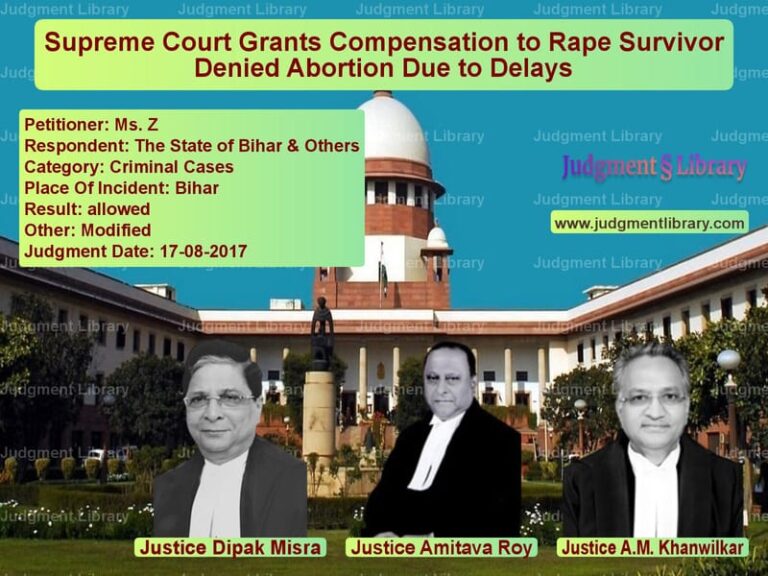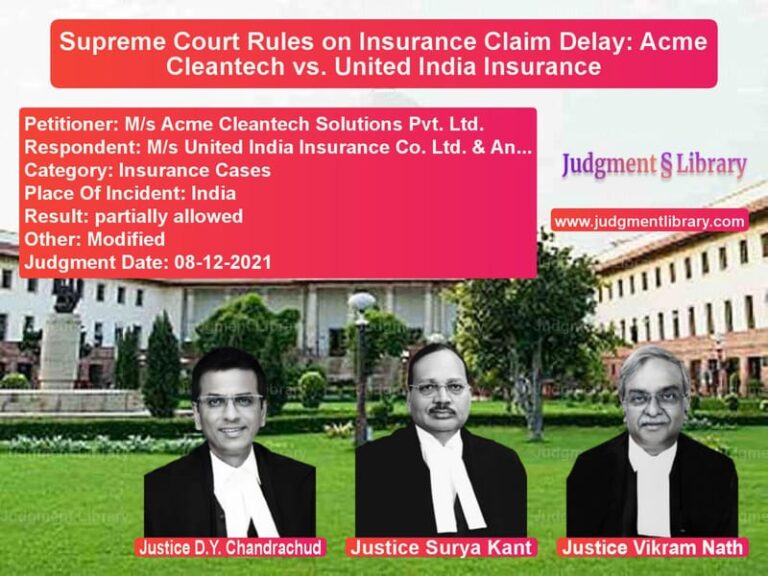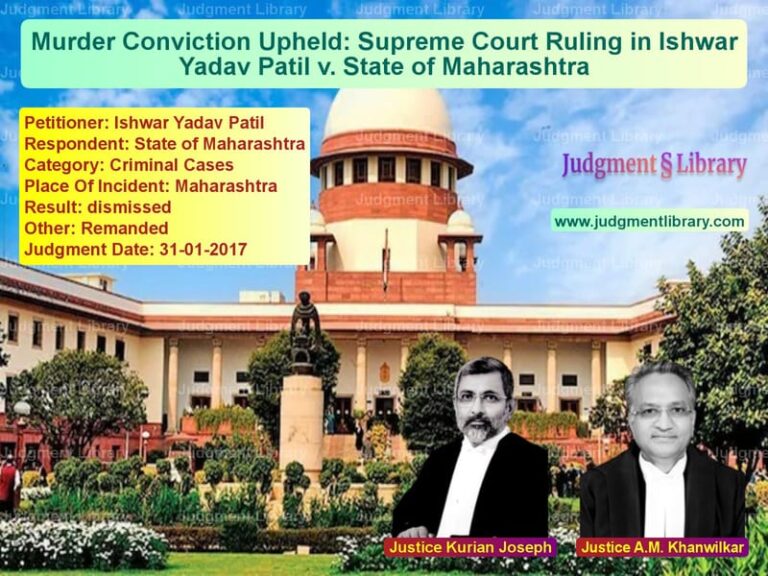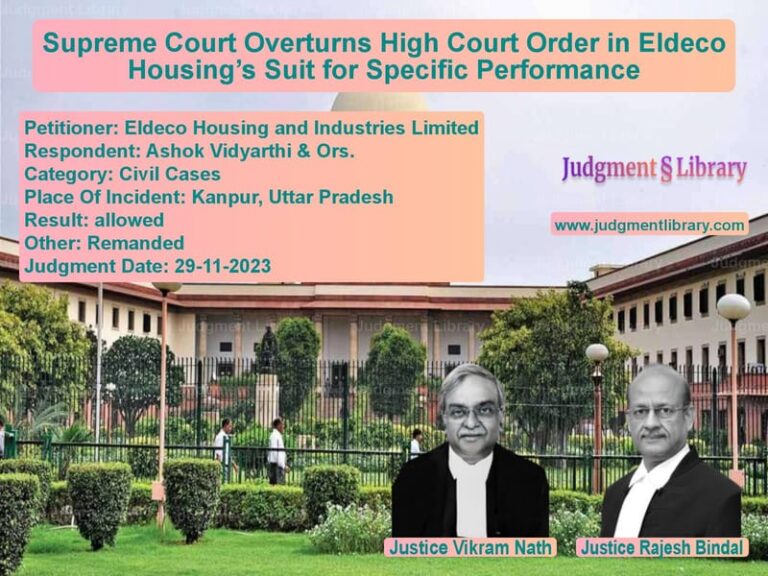Supreme Court Cancels Bail in UAPA Case Against PFI Members
The case of Union of India vs. Barakathullah & Others is a significant ruling where the Supreme Court quashed the bail granted by the Madras High Court to members of the Popular Front of India (PFI) accused of serious offenses under the Unlawful Activities (Prevention) Act (UAPA). The judgment, delivered on May 22, 2024, emphasized that courts must apply strict scrutiny in granting bail in cases related to national security and terrorism.
Background of the Case
The National Investigation Agency (NIA) registered FIR No. RC-42/2022/NIA/DLI on September 19, 2022, against the respondents and other members of PFI for allegedly conspiring to commit terrorist acts, raising funds for terrorist activities, and recruiting individuals for extremist ideology. The case was based on intelligence that PFI had been spreading radical ideologies across Tamil Nadu and training members for violent acts.
Charges were framed under:
- Indian Penal Code (IPC): Sections 120B (criminal conspiracy), 121A (waging war against the state), 122 (collecting arms), 153A (promoting enmity), and 505 (statements creating public mischief).
- UAPA: Sections 13 (unlawful activities), 17 (raising funds for terrorism), 18 (conspiracy for terrorism), 18A (training for terrorism), and 18B (recruitment for terrorism).
The accused were arrested on September 22, 2022, and remained in custody. However, the Madras High Court, in an order dated October 19, 2023, granted them bail, prompting the Union of India to challenge the decision in the Supreme Court.
Read also: https://judgmentlibrary.com/supreme-court-cancels-bail-in-double-murder-case-a-legal-review/
Arguments by the Petitioner (Union of India)
Representing the NIA, the government argued:
- The High Court failed to properly assess the seriousness of the charges.
- The accused were actively involved in radicalization, training in the use of weapons, and promoting terrorism.
- The High Court overlooked witness statements detailing weapons training, bomb-making exercises, and plans to attack targets.
- Under Section 43D(5) of UAPA, bail should not be granted if there are reasonable grounds to believe the accusations are prima facie true.
- Granting bail posed a risk of the accused influencing witnesses and continuing unlawful activities.
Arguments by the Respondents (PFI Members)
The accused countered:
- The NIA had not provided direct evidence linking them to acts of violence.
- The prosecution relied on statements of protected witnesses who had also participated in training camps.
- The High Court’s order was valid as it found no concrete evidence proving terrorism-related offenses.
- They had already been in custody for nearly two years without trial.
Supreme Court’s Observations
1. Strict Application of Section 43D(5) of UAPA
The Supreme Court held that in cases under UAPA, bail should not be granted unless the court is satisfied that the accusations are not prima facie true. The Court noted:
“The High Court erred in applying a lenient standard while considering bail in a case involving national security and terrorism.”
2. Statements of Protected Witnesses Are Admissible
The Supreme Court ruled that witness statements, including those given under Section 164 of the CrPC, must be considered at the bail stage. The Court observed:
“The credibility of the witnesses cannot be tested at the bail stage. Their statements detailing arms training, bomb-making lessons, and recruitment activities provide sufficient grounds to deny bail.”
3. PFI’s Role in Radicalization and Terrorist Training
The Court reviewed the NIA’s evidence, which included:
- Testimonies from witnesses who attended training camps where PFI leaders taught combat techniques, use of weapons, and bomb-making.
- Digital evidence showing PFI’s links to banned terrorist organizations.
- Videos and documents seized from the accused proving their involvement in violent training activities.
4. Risk of Witness Tampering
The Court agreed with the prosecution’s concern that the accused, if released, could intimidate witnesses. It stated:
“Releasing the accused could lead to obstruction of justice, given their influence and organized network.”
Key Findings and Judgment
The Supreme Court concluded:
- The High Court’s bail order was based on an incorrect assessment of the seriousness of the allegations.
- The material presented by the NIA showed prima facie involvement of the accused in acts preparatory to terrorism.
- The accused should remain in custody given the nature of the allegations and the potential impact on national security.
The Court ruled:
“The bail orders passed by the Madras High Court on October 19, 2023, are hereby quashed. The respondents shall surrender immediately before the NIA authorities.”
Implications of the Judgment
- Strict Enforcement of UAPA: The ruling affirms that bail should not be granted lightly in cases involving terrorism-related offenses.
- Protection of Witnesses: Courts must consider the risk of witness tampering when granting bail in such cases.
- Judicial Review in Terrorism Cases: High Courts must rigorously examine evidence before granting bail in UAPA cases.
- Strengthening National Security Laws: The judgment sets a precedent for handling similar cases involving organizations linked to extremist activities.
Conclusion
The Supreme Court’s decision in Union of India vs. Barakathullah & Others reinforces the principle that cases involving national security must be treated with the utmost seriousness. By overturning the bail order, the Court has emphasized the need for stringent judicial scrutiny in terrorism-related cases and ensured that individuals accused of serious offenses under UAPA remain in custody while facing trial.
Petitioner Name: Union of India.Respondent Name: Barakathullah & Others.Judgment By: Justice Bela M. Trivedi, Justice Pankaj Mithal.Place Of Incident: Tamil Nadu.Judgment Date: 22-05-2024.
Don’t miss out on the full details! Download the complete judgment in PDF format below and gain valuable insights instantly!
Download Judgment: union-of-india-vs-barakathullah-&-othe-supreme-court-of-india-judgment-dated-22-05-2024.pdf
Directly Download Judgment: Directly download this Judgment
See all petitions in Bail and Anticipatory Bail
See all petitions in Terrorist Activities
See all petitions in Extortion and Blackmail
See all petitions in Judgment by Bela M. Trivedi
See all petitions in Judgment by Pankaj Mithal
See all petitions in allowed
See all petitions in Quashed
See all petitions in supreme court of India judgments May 2024
See all petitions in 2024 judgments
See all posts in Criminal Cases Category
See all allowed petitions in Criminal Cases Category
See all Dismissed petitions in Criminal Cases Category
See all partially allowed petitions in Criminal Cases Category







